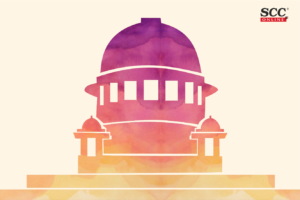Supreme Court: In the case where the Governor of Haryana had directed compulsory retirement of an Additional District and Sessions Judge after the Full court of Punjab and Haryana High Court had directed the same after finding him guilty of unexplained bank transactions, the bench of UU Lalit and Ajay Rastogi, JJ upheld the decision of the Full Court and said,
“… there were multiple transactions showing deposits and withdrawals of substantial amounts of money, it cannot be said that the Full Court was not justified in taking the view that it did.”
What was the case about?
- The petitioner had joined Haryana Judicial Services on 16.02.1996 and was promoted in 2008 to the Haryana Superior Judicial Services. Pursuant to certain complaints made against the petitioner, including one made by the Bar Association, an enquiry was conducted, during the course of which the petitioner was asked to furnish statements regarding his bank accounts and property for the years 2006 to 2009.
- While a preliminary report found that there was no documentary evidence regarding allegations of land purchases, it was, however, observed that there were “heavy unexplained bank transactions”.
- On 26.04.2012, a charge-sheet was served upon the petitioner accusing him of conduct against judicial ethics inasmuch as he had deposited and withdrawn large sums of money without giving any specific reason for that.
- The petitioner submitted that those irregular deposits in his accounts were from the maturity amounts of his LIC policies, sale of properties which were acquired by him before he entered the judicial service, maturity of PPF accounts and other bank bonds.
- The Inquiring Authority submitted a report on 23.05.2016 finding the petitioner guilty of unexplained transactions.
- The Vigilance/Disciplinary Committee of the High Court, however, found that the charges levelled against the petitioner were not proved and recommended that he be cleared of all the charges.
- On 04.02.2019, the matter be referred back to the Vigilance/Disciplinary Committee by the Full Court to scrutinize the property statements of the petitioner and the matter be put up before the Full Court thereafter.
- The Vigilance/Disciplinary Committee submitted its report on 18.12.2019.
- The Full Court in its meeting dated 14.12.2020, after full deliberation, rejected the report dated 18.12.2019 of the Vigilance/Disciplinary Committee and stated,
“… we find that the Inquiry Authority has rightly rejected, for the reasons recorded, the defence plea raised by the delinquent Officer regarding retaining huge amounts of cash in hand for the substantial periods in the financial years concerned, after admitting the withdrawals and deposits from the accounts specified in the Articles of Charge, which required no further proof.”
- An order was, thereafter, issued by the Competent Authority on 05.01.2021 compulsorily retiring the petitioner as a measure of penalty from the membership of Haryana Superior Judicial Service.
Is vigilance Committee’s order binding on the Court?
It was argued before the Court that once the Vigilance Committee had concluded that there was nothing against the petitioner, such conclusion was “for and on behalf of the Full Court” of the High Court and that the Full Court could not and ought not to have recommended compulsory retirement of the petitioner.
The Court, however, explained the law laid down in State of Uttar Pradesh v. Batuk Deo Pati Tripathi, (1978) 2 SCC 102 and said that in the said judgment, the Supreme Court had accepted that for the convenience of transacting administrative business and for smooth functioning of day-to-day matters pertaining to control over the subordinate judiciary, it would be possible for the High Court to authorize and empower an Administrative Judge or an Administrative Committee of Judges to act on behalf of the Court. It does not however mean that even in the absence of Rules authorizing or empowering the Committee, the decision made by or conclusions arrived at by the Committee would be binding on the Full Court or that the Full Court would not be within its jurisdiction to take a different view in the matter.
[Rajinder Goel v. High Court of Punjab and Haryana, 2021 SCC OnLine SC 528, decided on 02.08.2021]
*Judgment by: Justice UU Lalit
For petitioner: Manoj Swarup, Senior Advocate

